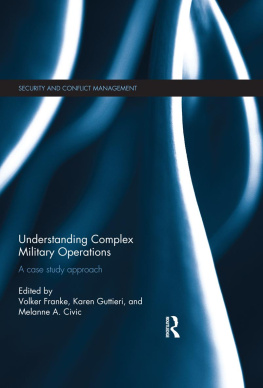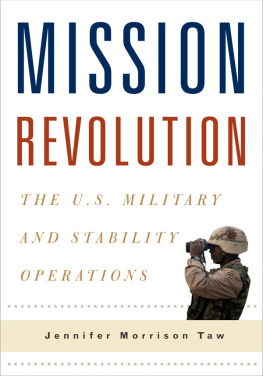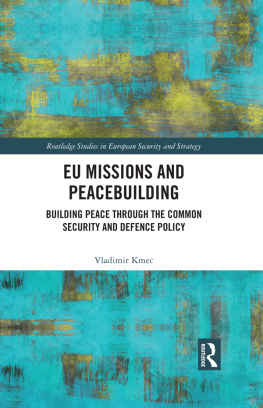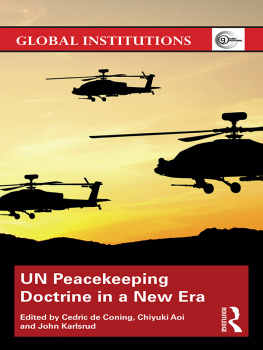Understanding Complex Military Operations
This volume provides materials for active learning about peacebuilding and conflict management in the context of complex stability operations.
Today, America faces security challenges unlike any it has faced before, many of which requiring lengthy U.S. involvement in stability operations. These challenges are exceedingly dynamic and complex because of the ever-changing mix and number of actors involved, the pace with which the strategic and operational environments change, and the constraints placed on response options.
This volume presents a series of case studies to inspire active learning about peacebuilding and conflict management in the context of complex stability operations. The case studies highlight dilemmas pertaining to the story of the case (case dilemma) and to its larger policy implications (policy dilemma). The cases stimulate readers to get inside the heads of case protagonists with widely differing cultural backgrounds, professional experiences, and individual and organizational interests. Overall, Understanding Complex Military Operations challenges the reader to recognize the importance of specific national security related issues and their inherent dilemmas, deduce policy implications, and discern lessons that might apply to otherperhaps even non-security relatedareas of public policy, administration, and management.
This volume will be of much interest to students of conflict prevention, transitional justice, peacebuilding, and security studies, and professionals conducting field-based operations in potentially hazardous environments.
Karen Guttieri is Assistant Professor at the Naval Postgraduate School, Monterey, California, U.S.
Volker Franke is Professor of Conflict Management at Kennesaw State University, Georgia, U.S., and is author/editor of three books.
Melanne A. Civic is the Special Advisor to the Center for Complex Operations (CCO) at the National Defense University (NDU), U.S., and is an attorney.
Series: Security and Conflict Management
Series Editors:
Fen Osler Hampson
Carleton University, Canada
Chester Crocker
Georgetown University, Washington DC
Pamela Aall
United States Institute of Peace, Washington DC
This series will publish the best work in the field of security studies and conflict management. In particular, it will promote leading-edge work that straddles the divides between conflict management and security studies, between academics and practitioners, and between disciplines.
Negotiation and Conflict Management
I. William Zartman
Conflict Management and African Politics
Negotiation, mediation, and politics
Terrence Lyons and Gilbert M. Khadiagala (eds)
International Conflict Mediation
New approaches and findings
Jacob Bercovitch and Scott Sigmund Gartner (eds)
International Mediation in Civil Wars
Bargaining with bullets
Timothy D. Sisk
Conflict Transformation and Peacebuilding
Moving from violence to sustainable peace
Bruce Dayton and Louis Kriesberg (eds)
Theory and Practice of International Mediation
Selected essays
Jacob Bercovitch
UN Sanctions and Conflict
Responding to peace and security threats
Andrea Charron
Territorial Disputes and Conflict Management
The art of avoiding war
Rongxing Guo
Aid, Insurgencies and Conflict Transformation
When greed is good
Rob Kevlihan
Human Security in Turkey
Challenges for the 21st century
Alpaslan zerdem and Fsun zerdem (eds)
Understanding Complex Military Operations
A case study approach
Edited by Karen Guttieri, Volker Franke, and Melanne A. Civic
National security is more an essential than a phrase. For it to be strong is for it to be studied. To think strategically about it is strengthened by looking back at examples of the past. The case studies contained herein offer both context and content to do things better and to make life better.
F. William Smullen, Director, National Security Studies, The Maxwell School, Syracuse University Chief of Staff to Secretary of State Colin L. Powell (20012003)
This book of case studies will be an invaluable resource for students and practitioners of complex operations across its spectrum from conflict prevention and stabilization to peace-building, as well as in political transitions of various kinds. The business school case study format places the student in a real world scenario, where they must make decisions that require difficult trade-offs and derive an understanding of many different perspectives. This time-tested teaching method helps to ground the learning experience in a solid foundation. This case studies book brings to life the academic literature while giving students practical exposure to a wide range of situations in response to which they can develop their own insights and conclusions.
Clare Lockhart, co-founder and CEO of the Institute for State Effectiveness
The case method is a natural addition to training and education for complex operations. When the Case Center of the Georgetown University Institute for the Study of Diplomacy was asked to participate, we shared an analytical technique that would apply experiential learning in a new way. The central question for students of complex operations is: confronted by a new environment, how does an expert practitioner interpret the situation and reach new insights? There are many similarities that practitioners face in Iraq and Afghanistan, but successful operations in one environment is not wholly a recipe for success in the other. Teaching with the case method builds the analytical, decision-making skills that are not case, or lesson, dependent. The case study method and the practitioners who contributed to this volume have established a solid foundation for future complex operations.
Charles Dolgas, Director of Publication
Institute for the Study of Diplomacy, Georgetown University
The origins of this case studies volume was a collaboration between the nascent Center for Complex Operations and the Naval Post Graduate School, with the aim of improving the ability of the U.S. Government to prepare for civilmilitary cooperation in counterinsurgency, irregular warfare and stability operations. Complex operations are tough! As soldiers, policy makers, peacekeepers, academics and other experts engaged in complex operations, we continue to face challenges, even after a decade of civilian-military cooperation in Iraq and Afghanistan. These case studies are designed to enhance the learning and analytical processes and better prepare professionals for the range of complex operations. And maybe, the next time we find ourselves shoulder-to-shoulder doing the difficult and necessary work inherent in complex operations, things will be just a little bit easier.
David A. Sobyra, Director for Global Threats
Office of the Secretary of Defense and Acting Director (20082009) of the Center for Complex Operations
Among the challenges of complex operations and practical learning broadly is ensuring that the experiences of individuals, and their collective insights, are integrated into training and education. With the staccato operational tempo, the rapid turn-over of personnel, and the time-urgency of two ongoing hot wars at the time, the challenge was how best to refine analysis and decision making skills of those who would be called into field operations. These case studies provide pertinent facts derived from first-hand experience, with scenarios drafted by practitioners and others. With the accompanying teaching notes derived from personal insights, this volume provides a method for conveying valuable experiential learning even in situations of ambiguity and uncertain outcomes.











